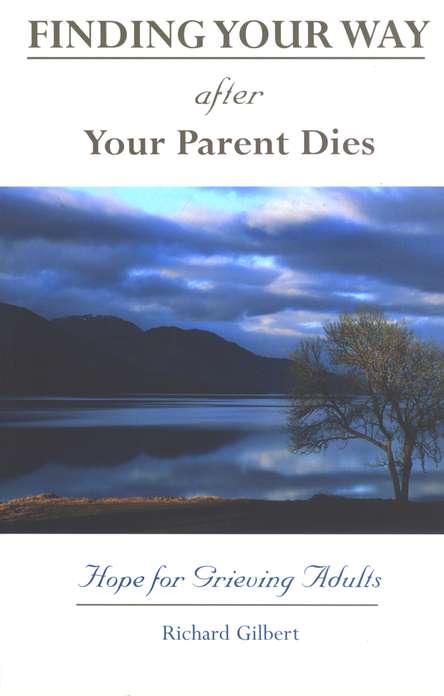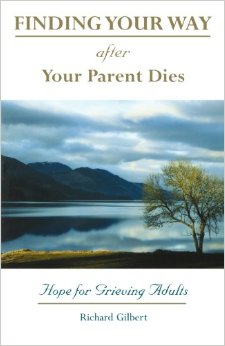 Richard Gilbert, an Anglican priest and the author of “Finding Your Way after Your Parent Dies: Hope for Grieving Adults,” has the very best intentions. In the introduction to the book, he is clear about breaking free of proscribed ideas regarding the stages of grief and appropriate timelines for grief work, in favor of a more personal journey informed by a grieving individual’s emotional experience. He also writes, “[W]e must recognize the connection between grief and spirituality if we are to be honest with all of our story and the profound impact grief has on us. All of us are spiritual, however we choose to claim it.” While this may seem like an inclusive position, specific Christian ideas tend to creep into Gilbert’s advice, potentially alienating people who identify as non-theists (such as Buddhists and atheists) and polytheists (such as Hindus and those of Celtic, African and indigenous American descent).
Richard Gilbert, an Anglican priest and the author of “Finding Your Way after Your Parent Dies: Hope for Grieving Adults,” has the very best intentions. In the introduction to the book, he is clear about breaking free of proscribed ideas regarding the stages of grief and appropriate timelines for grief work, in favor of a more personal journey informed by a grieving individual’s emotional experience. He also writes, “[W]e must recognize the connection between grief and spirituality if we are to be honest with all of our story and the profound impact grief has on us. All of us are spiritual, however we choose to claim it.” While this may seem like an inclusive position, specific Christian ideas tend to creep into Gilbert’s advice, potentially alienating people who identify as non-theists (such as Buddhists and atheists) and polytheists (such as Hindus and those of Celtic, African and indigenous American descent).
 Let’s look at the useful bits first. Gilbert strongly emphasizes throughout the book that each individual’s grief journey will look different in terms of which emotions are felt; how they are expressed; in what order they occur; and over what period of time. He provides useful tips for creating healthy boundaries to do so. In later chapters, he shares insight into the experience of mourning a parent’s death while continuing to relate with a parent who is still alive. He also touches on the complexity of grief when there was abuse involved in the relationship with the dead person. Discussing complex grief such as this is worthy of note, because not all self-help books on grief cover these all-too-common situations.
Let’s look at the useful bits first. Gilbert strongly emphasizes throughout the book that each individual’s grief journey will look different in terms of which emotions are felt; how they are expressed; in what order they occur; and over what period of time. He provides useful tips for creating healthy boundaries to do so. In later chapters, he shares insight into the experience of mourning a parent’s death while continuing to relate with a parent who is still alive. He also touches on the complexity of grief when there was abuse involved in the relationship with the dead person. Discussing complex grief such as this is worthy of note, because not all self-help books on grief cover these all-too-common situations.
Gilbert, however, deeply entwines these functional, widely applicable ideas with overt language and ideas from the Christian faith. He tries to speak of spirituality as the search “for meaning, for purpose, and… some reason that life is worth living.” However, he immediately goes on to say that losing a parent is akin to losing a spiritual mentor, and that finding one’s way through the grief journey of losing a parent will lead one to “meet God and, ultimately, [one]self.” Gilbert offers no ideas about who or what this “God” is, other than a refuge and comfort — in effect, a cosmic parent. This is not useful for anyone who does not already have a clear idea of what God means for them, or who does not agree with the idea of God as a parental figure. Other world views understand love and comfort as particularly human ways of making meaning and peace with an ultimately neutral universe of cause and effect.

An image of the Vedic deva Indra. Hindus and those who understand the Vedic concept of what God is comprise the fourth largest spiritual group in the USA. Twenty four percent of Americans believe in reincarnation — a core concept in this world view
(Credit: tamilandvedas.com)
Gilbert also acknowledges that grieving adult children — no matter what age they may be — often feel orphaned and pressured to take on “adult” roles and responsibilities while facing the fact of their own mortality. Yet he completely neglects to mention the source of these feelings. Other experts in the field of grief would point out the person’s upbringing may have failed to prepare them for the universal experience of a parent’s death. In some cultures, for example, a childhood rite of passage inducts children into the experience of their own mortality, thereby making them more able to accept the roles and responsibilities of an adult. Instead of taking this multi-generational, multicultural approach, Gilbert offers basic moment-to-moment coping skills and the comfort of a supposedly benevolent God/parent.
Gilbert’s advice on spirituality has less to do with the growth and transformation implicit in the grief journey than with the sleeping pill of a last-resort bedtime story about how it will all be okay in the end. This book would have greatly benefited from incorporating other world views that involve a reciprocal relationship with the dead, where they are spoken with and actively remembered, as opposed to simply memorialized and placed on the mantle.

 ”Finding Your Way after Your Parent Dies” by Richard Gilbert
”Finding Your Way after Your Parent Dies” by Richard Gilbert


 Flawed Kidney Function Test Discriminated Against Black Patients
Flawed Kidney Function Test Discriminated Against Black Patients

 Harmony Amidst Change: Japan’s Kezouin Fuchu-shi Cemetery
Harmony Amidst Change: Japan’s Kezouin Fuchu-shi Cemetery














